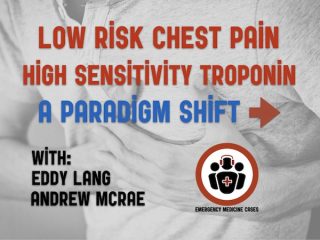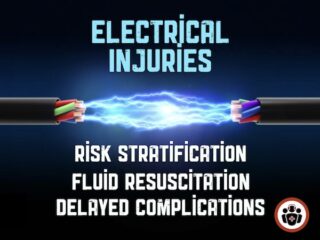
Ep 130 Community Acquired Pneumonia: Emergency Management
While community acquired pneumonia (CAP) is 'bread and butter' emergency medicine, and the diagnosis is often a 'slam dunk', it turns out that up one third of the time, we are wrong about the diagnosis; that x-rays are not perfect; that blood work is seldom helpful; that not all antibiotics are created equal and that deciding who can go home and who needs to go to the ICU isn’t always so clear cut. With this in mind we are taking a deep dive into CAP, from diagnosis to disposition so that we can better achieve our EM goals of stabilizing sick patients, getting the right diagnosis, initiating the best treatment with the information at hand, prognosticating/appropriately deciding on disposition of patients, and being healthcare and antimicrobial stewards...
Ep 129 ED Overcrowding and Access Block – Causes and Solutions
Howard Ovens, Grant Innes, Sam Campbell and Anton discuss the root causes, challenges and some of the solutions of one of the defining characteristics of emergency medicine in the 21st century - overcrowding. It is absolutely in the interest of every single ED provider to understand how this problem came to be, and what we can do about it. As citizens of the medical community, becoming aware of the issues that drive ED overcrowding will be a powerful asset in the drive for change. We hope to equip you with the knowledge and actionable moves to effect change on your next shift at the individual level, at the ED level, and even at the hospital and government levels…
Ep 128 Low Risk Chest Pain and High Sensitivity Troponin – A Paradigm Shift
In the age of high sensitivity troponins and the HEART pathway, which patients are safe to discharge home from the ED? What are the most useful historical factors to increase and decrease your pretest probability for ACS? Which cardiac risk factors have predictive value for ACS? Why should the words "troponitis" and "troponemia" be banned? How should high sensitivity troponin be interpreted differently than conventional troponin? Which is better for delta troponin interpretation - an absolute change in troponin or a percentage change? Which delta troponin is best - 1hr, 2hr or 3hr? What are the limitations of the HEART pathway? and many more....
Ep 127 EM Drugs that Work and Drugs that Don’t Part 2 – Antiemetics, Angioedema, Oxygen
In this Episode 127 Drugs that Work and Drugs that Don't Part 2 - Antiemetics, Angioedema and Oxygen, with Justin Morgenstern and Joel Lexchin we discuss the evidence for various antiemetics like metoclopramide, prochlorperazine, promethazine, droperidol, ondansetron, inhaled isopropyl alcohol and haloperidol as well as why should not use an antiemetic routinely with morphine in the ED. We then discuss the evidence for various drugs options for a potpourri of true emergencies like angioedema and hyperkalemia, and wrap it up with a discussion on oxygen therapy...
Ep 126 EM Drugs That Work and Drugs That Don’t – Part 1: Analgesics
In this podcast we discuss the key concepts in assessing drug efficacy trials, and provide you with a bottom line recommendation for the use of gabapentinoids, NSAIDs and acetaminophen for low back pain and radicular symptoms, topical NSAIDs and cyclobenzaprine for sprains and strains, caffeine as an adjunct analgesic, why we should never prescribe tramadol, dexamethasone for pharyngitis, calcium channel blockers for hemorrhoids and anal fissures, buscopan for abdominal pain and renal colic and why morphine might be a better analgesic choice than hydromorphone...
Ep 125 Electrical Injuries – The Tip of the Iceberg
Electrical injuries are rare, representing less than 1% of burn center admissions. So there is a paucity of robust evidence for the management of these patients. Nonetheless, in this podcast we’ll give you the tools to help risk stratify electrical injuries, give some guidance on fluid resuscitation, describe immediate management of acute complications and make you aware of the potential delayed complications that must be anticipated...







